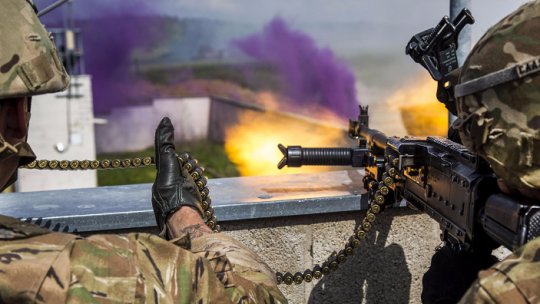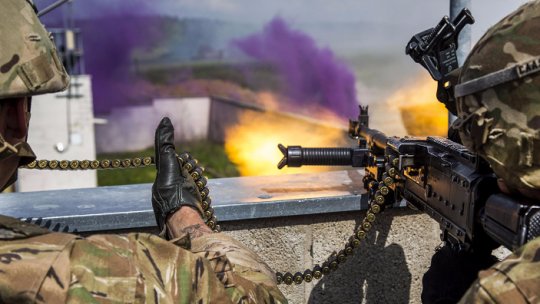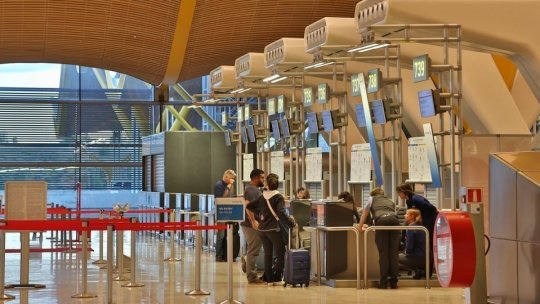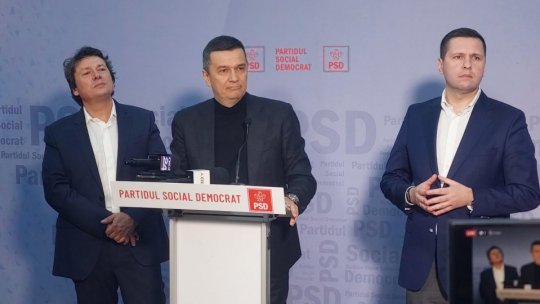RRA: Exclusive interview with the Chairman of the NATO Military Committee
During his stay in Romania, the Chairman of the NATO Military Committee, General (four star) Petr Pavel, accepted to offer an exclusive interview for RRA
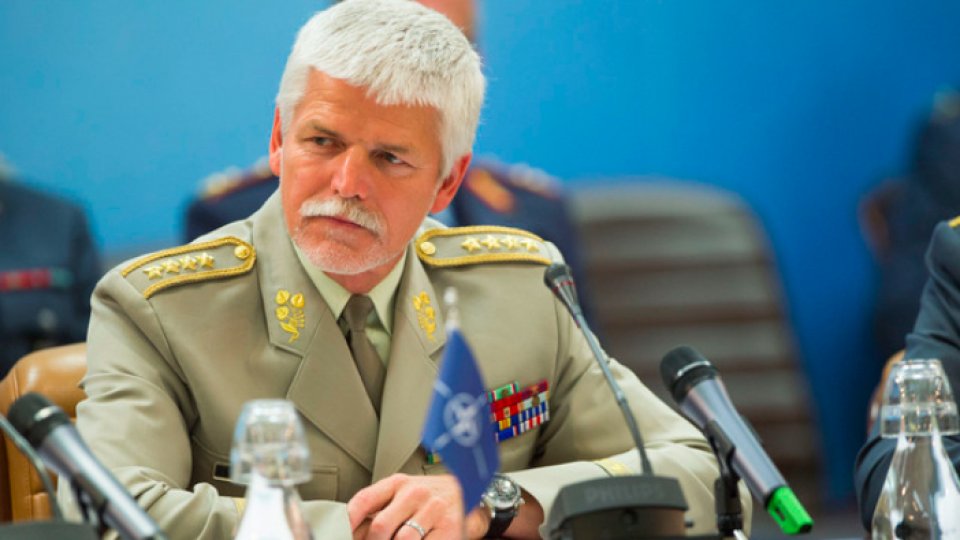
Articol de Radu Dobriţoiu, 15 Iulie 2017, 22:41
Radu Dobriţoiu: First of all, I thank you, Mr. Petr Pavel, for this interview for Radio Romania. You've already visited the Cincu Training Center, you've seen our soldiers on the training field, you know about our presence in Afghanistan. General Pavel, tell us your opinion ... How do you see Romania's importance within NATO?
Gen. Petr Pavel: Let me first thank you for taking this interview, it is a pleasure to be back in Romania. I am not saying anything new when I maintain that Romania is considered a very important and good member of NATO from all points of view - the contribution, the approach in all the meetings, the procedures we have. Romania has participated in a large number of activities in all major operations, making important contributions to all the activities that NATO is pursuing bilaterally on a military and political level. To synthesize Romania's participation in NATO: it is very visible and in a positive light.
Radu Dobriţoiu: We are also very involved with Deveselu's strategic base, the Mihail Kogălniceanu base, military bases for American troops, we have new training facilities, we have Cincu, Smârdan firing range areas, and over the recent years, we have had new and wide military exercises. How do you see the Romanian Army?
Gen. Petr Pavel: My first impression, of course I cannot say exactly, because I have not seen any progress report so far, the first impression is that the Romanian militaries are very dedicated, professional. Despite a number of deficiencies in the equipment, in some procedures, they are working hard to meet all the standards. And I think that Romania is now on the right track to overcome all the deficiencies, with a ten-year program approved by the political leaders. Your country has a great support in the person of the President, I have had the chance to talk to the Defense Minister, who is also very determined to follow this path. The Chief of Romanian Army's General Staff is working hard alongside his team to ensure full operability and to be a useful and important part of mission exercises. I believe that Romania is heading for a bright future on the military side.
Radu Dobriţoiu: You talked about the two percentages of GDP for the Defense. Romania is among the six NATO allies with this defense budget. How do you see this budget in terms of military purchases? What's most important for the Romanian Army? We are talking about Patriot Missile Defense Systems or F16 planes, what do you think is more important for the Romanian army?
Gen. Petr Pavel: I cannot speak on behalf of the Romanians, it is up to Romanian leaders to set priorities, we can only give advice. Within NATO, as you know, there is a Defense plan where each country negotiates with NATO the so-called procurement targets and each country agrees with the list of targets that NATO prefers for countries. The cycle for the next four years has now been completed, a certain percentage of each target has been allocated to nations, there are a number of areas that NATO suggests to allies, focus their attention on the procurement process. What I could see in the case of Romania, similar to my country, the Czech Republic, the elements that we, as a nation, have allocated for NATO are fully operational. That means we are talking about a brigade that in the future has to have a total framing for the battle, that is, all the elements they ask without external support.
Gen. Petr Pavel: There are some more specific capabilities that NATO has in mind. You mentioned the air defense; I can tell you about information-related equipment, about drones - the logistics capabilities that are needed to facilitate movements in Europe, to facilitate troop deployments. So, all of them are listed and all member nations have complete lists with the necessary capabilities. In any case, setting priorities on this list is clearly a national problem, and I'm sure your authorities will make the right decision.
Radu Dobriţoiu: Again, as far as air defense and Patriot missiles are concerned, we know that Poland is in the same situation and wants to buy such missiles. Would it be good for Romania to send a similar air defense system to interconnect with the Eastern NATO flank?
Gen. Petr Pavel: I will not make any kind of advertising and I will not plead for a specific product. What is important is that these devices are interoperable. Beyond the brand of the product or the manufacturer, they have to communicate with one another, they have to count on an integrated system - this is important. Within NATO, we have integrated anti-missile and air defense systems, and any system that meets the criteria and can be connected in this integrated environment is welcome.
Radu Dobriţoiu: I have brought into discussion the fact that NATO's Eastern flank is becoming more and more important to the Allies. We will also look to Turkey and its relations with Russia, but before we will talk about Russia ... How do you see the future of NATO's Eastern flank?
Gen. Petr Pavel: We need to finalize all the objectives and apply all the measures we have agreed upon under the so-called Readiness Action Plan (RAP) and we must take all the successive steps to improve the Graduate Readiness Plan, the concept of support, the consolidation concept, the authorization concept - all this will create the global image of a credible deterrent force against an opponent like Russia. All these aspects must be completed and the good news is that we already have the conceptual agreement, we have the plans, we have the measures, so it is time to implement all these measures. We will have to pay more attention to the Southern flank of the North Atlantic Alliance, because in this area we are less comfortable in terms of conceptual agreement and practical steps. However, some individual measures and concrete actions have been taken but they need to be joined together to have a comprehensive package in this area. So these two challenges need to be addressed at the same time, and this is the direction we are heading for.
Radu Dobriţoiu: As far as the Eastern flank is concerned, what can you say about relations between NATO and Russia?
Gen. Petr Pavel: We do not see Russia as an enemy. I believe that many NATO nations see Russia as a partner rather than an opponent. However, we must be realistic and confront with concrete actions, not just words. When we see Russia's actions in Georgia, in Ukraine, in Transnistria, when we see that program of exercises that is increasingly oriented towards the Eastern Allies, when we see the degree of modernization of Russian military equipment, when we take into account the Russian leaders' statements, we are prepared to reject potential actions against the North Atlantic Alliance. That is the reason we have adopted so many measures, that is why we are improving our deterrence: not to threaten Russia, but to be prepared to reject any potential aggression at any time. Beyond our deterrent forces, we are, of course, open to dialogue with Russia. I have repeatedly underlined that both at political and military level we are prepared to engage in a dialogue. So far we have insisted on the political side, there have been five meetings in the NATO-Russia Council - the last one took place yesterday, where we discussed common interests. We have the same desire to reinforce the military dialogue, focusing in particular on risk mitigation and transparency, avoiding escalations and unnecessary incidents. So far, we have had a conversation with the Chief of General Staff of the Russian forces, General Valeri Gherasimov, and we are working towards continuing this dialogue at military level.
Radu Dobriţoiu: After Russia occupied Crimea and the Donbas region, the balance of power in the Black Sea has changed. What importance does the Black Sea have for NATO, having Romania in the middle?
Gen. Petr Pavel: The Black Sea is a strategic region for many reasons. First of all, it is an important strategic region for NATO, it is an important strategic region for Russia, it is a vital route for energy and consumer goods, and we do our utmost to maintain stability in the region, free for navigation and trade. To achieve this, we cannot afford any kind of imbalance in the area - and that is the reason we pay a lot of attention to this region, this is the reason why we now have these series of exercises in the area and have increased the maritime presence, to clearly demonstrate that we cannot allow situations that could make the Black Sea become a single nation's territory. We want to keep the Black Sea space as open as possible, this is our main objective.
Radu Dobriţoiu: And one last question. In Brussels, NATO leaders discussed the Alliance's involvement in Syria. What kind of support could NATO offer to Syria?
Gen. Petr Pavel: At this moment, NATO is not directly involved in Syria. You know, of course, that NATO has become a member of the international coalition against ISIL, NATO has supported this coalition from the start. We have stepped up our support for the coalition by delivering AWACS planes to provide the coalition with an operational picture during the actions. We have also assured the training of Iraqi forces in Iraq and Jordan. By virtue of our membership in the international coalition, we will improve coordination with other coalition allies in terms of "local capacity building" (RADOR Press Agency note: to strengthen the capacity of local forces to develop, implement and support capabilities to maintain local control). Of course, once ISIL is defeated in Iraq, we will be ready to discuss with the coalition the next steps regarding Syria. So far, we are open to talks within the international coalition. NATO has tremendous potential through which - thanks to our expertise, structures and capabilities - it can provide special assistance to local forces in building and strengthening their own capabilities. We have a long-standing expertise – following operations in Afghanistan - in training, assistance and counseling, and NATO member nations are ready to extend this assistance according to the evolution of the situation.
Radu Dobriţoiu: Thank you.
Gen. Petr Pavel: Thank you.
RADOR Press Agency transcription.
Source:RRA.Translated by Miruna Matei

